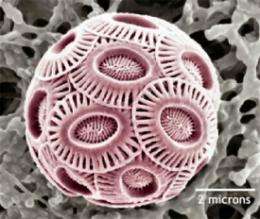Tiny organisms give big warning about planet health

San Francisco State University scientists are studying whether a hardworking microscopic organism that helps rid the planet of too much carbon dioxide will continue to work so well in the year 2100, when the Earth’s oceans are expected to be more acidic.
At the Romberg Tiburon Center for Environmental Studies (RTC), scientists have created large tanks of specially mixed seawater that simulates the future ocean.
Added to these tanks are microscopic phytoplankton, which play a crucial role in the process that allows the oceans to remove carbon dioxide or CO2 from the Earth's atmosphere. The chalky shell that this phytoplankton forms, called a cocolithophore, absorbs CO2 and sinks to the ocean floor, where the gas remains trapped. But growing levels of acid in the ocean, caused by the burning of fossil fuels, are now compromising the quality of the shell and its ability to absorb CO2.
"It's been estimated that this organism is involved in about 85 percent of the transfer of greenhouse gasses to deep water," said Professor of Biology Edward Carpenter. "If it wasn't for phytoplankton like this, we would be cooked."
The research by the RTC team, which also includes Professor of Biology Jonathon Stillman and Professor of Chemistry Tomoko Komada, is funded by the National Science Foundation.
Provided by San Francisco State University


















